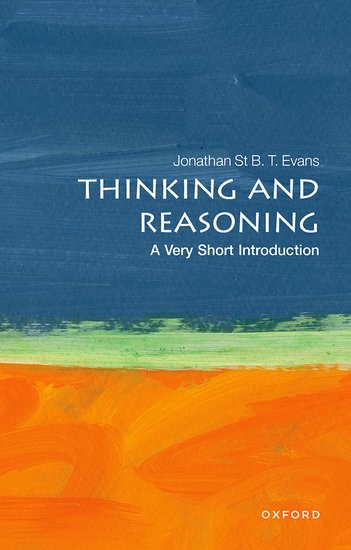Home >
A Very Short Introduction >
Thinking and Reasoning (Philosophy)
A Very Short Introduction | Philosophy
Thinking and Reasoning
ISBN: 9780198787259
Series: A Very Short Introduction
Thinking and Reasoning (Philosophy)
A Very Short Introduction Thinking and Reasoning (Philosophy) Media > Books > Non-Fiction > Education Books Expect Delays of Up to 4 Weeks| Order Below |
ISBN
9780198787259 (10-digit ISBN: 0198787251)
- Description
- Key Features
- Series Description
- Table of Contents
- Analyses the uniquely human capacity to think and reason, which sets us apart from all other animals
- Explores the psychological processes involved in problem solving, decision making, and reasoning
- Describes the various approaches, from past theories to present day understanding of impact of past memory and cognitive biases
Our extraordinary capacity to reason and solve problems sets us aside from other animals, but our evolved thinking processes also leave us susceptibile to bias and error. The study of thinking and reasoning goes back to Aristotle, and was one of the first topics to be studied when psychology separated from philosophy. In this Very Short Introduction Jonathan Evans explores cognitive psychological approaches to understanding the nature of thinking and reasoning, problem solving, and decision making. He shows how our problem solving capabilities are hugely dependent on also having the imagination to ask the right questions, and the ability to see things from a completely new perspective. Beginning by considering the approaches of the behaviourists and the Gestalt psychologists, he moves on to modern explorations of thinking, including hypothetical thinking, conditionals, deduction, rationality, and intuition. Covering the role of past learning, IQ, and cognitive biases, Evans also discusses the idea that there may be two different ways of thinking, arising from our evolutionary history.
Oxford's Very Short Introductions series offers concise and original introductions to a wide range of subjects--from Islam to Sociology, Politics to Classics, Literary Theory to History, and Archaeology to the Bible.
Not simply a textbook of definitions, each volume in this series provides trenchant and provocative--yet always balanced and complete--discussions of the central issues in a given discipline or field. Every Very Short Introduction gives a readable evolution of the subject in question, demonstrating how the subject has developed and how it has influenced society. Eventually, the series will encompass every major academic discipline, offering all students an accessible and abundant reference library.
Whatever the area of study that one deems important or appealing, whatever the topic that fascinates the general reader, the Very Short Introductions series has a handy and affordable guide that will likely prove indispensable.
Please note: As this series is not ELT material, these titles are not subject to discount.
1: Introduction and history
2: Problem solving
3: Thinking hypothetically
4: Decision making
5: Reasoning
6: Are we rational?
7: From dual processes to two minds
References
Further Reading
Index
Our extraordinary capacity to reason and solve problems sets us aside from other animals, but our evolved thinking processes also leave us susceptibile to bias and error. The study of thinking and reasoning goes back to Aristotle, and was one of the first topics to be studied when psychology separated from philosophy. In this Very Short Introduction Jonathan Evans explores cognitive psychological approaches to understanding the nature of thinking and reasoning, problem solving, and decision making. He shows how our problem solving capabilities are hugely dependent on also having the imagination to ask the right questions, and the ability to see things from a completely new perspective. Beginning by considering the approaches of the behaviourists and the Gestalt psychologists, he moves on to modern explorations of thinking, including hypothetical thinking, conditionals, deduction, rationality, and intuition. Covering the role of past learning, IQ, and cognitive biases, Evans also discusses the idea that there may be two different ways of thinking, arising from our evolutionary history.
Key Features
- Analyses the uniquely human capacity to think and reason, which sets us apart from all other animals
- Explores the psychological processes involved in problem solving, decision making, and reasoning
- Describes the various approaches, from past theories to present day understanding of impact of past memory and cognitive biases
Series Description
Oxford's Very Short Introductions series offers concise and original introductions to a wide range of subjects--from Islam to Sociology, Politics to Classics, Literary Theory to History, and Archaeology to the Bible.
Not simply a textbook of definitions, each volume in this series provides trenchant and provocative--yet always balanced and complete--discussions of the central issues in a given discipline or field. Every Very Short Introduction gives a readable evolution of the subject in question, demonstrating how the subject has developed and how it has influenced society. Eventually, the series will encompass every major academic discipline, offering all students an accessible and abundant reference library.
Whatever the area of study that one deems important or appealing, whatever the topic that fascinates the general reader, the Very Short Introductions series has a handy and affordable guide that will likely prove indispensable.
Please note: As this series is not ELT material, these titles are not subject to discount.
EASY ORDER FORM
PRICES LISTED INCLUDE CONSUMPTION TAX
Price Before Tax:
¥1,790


